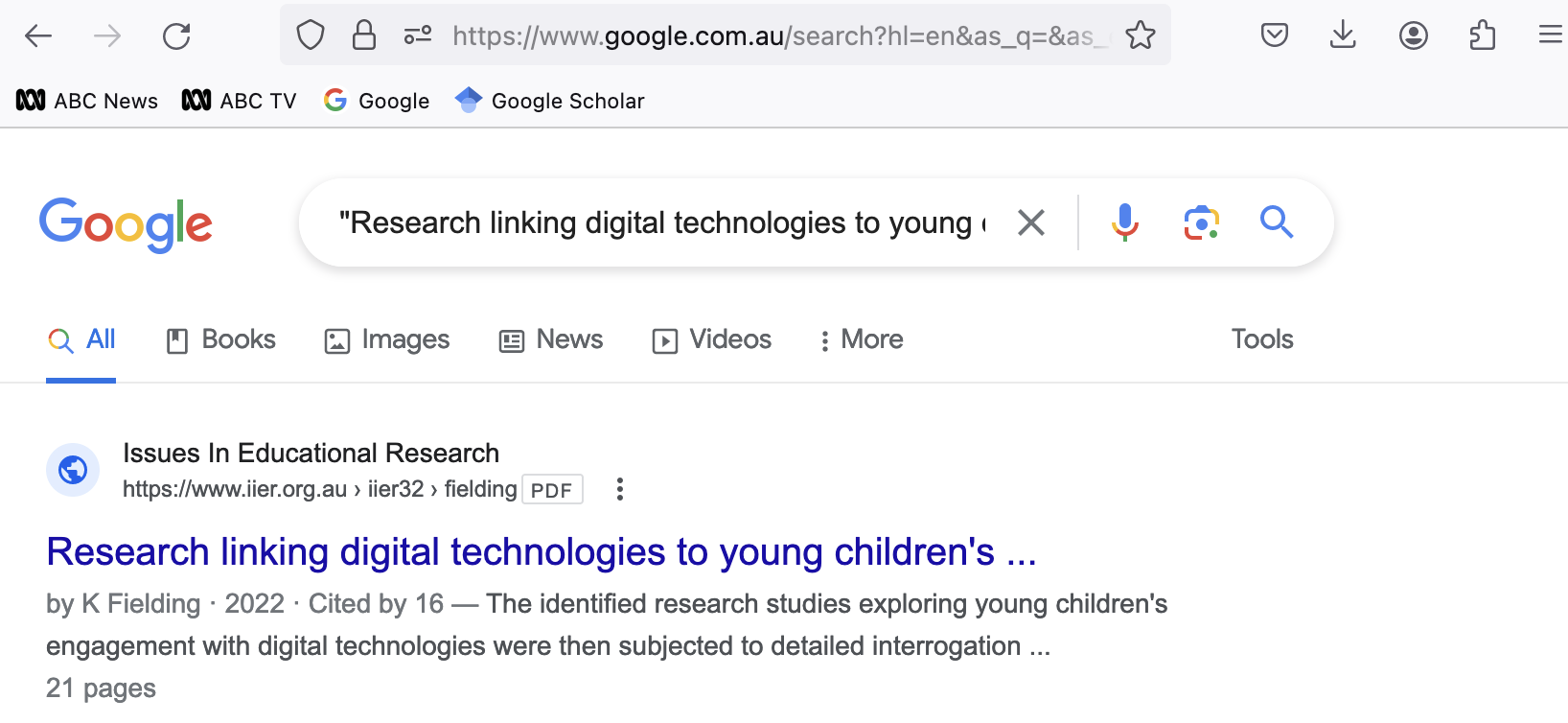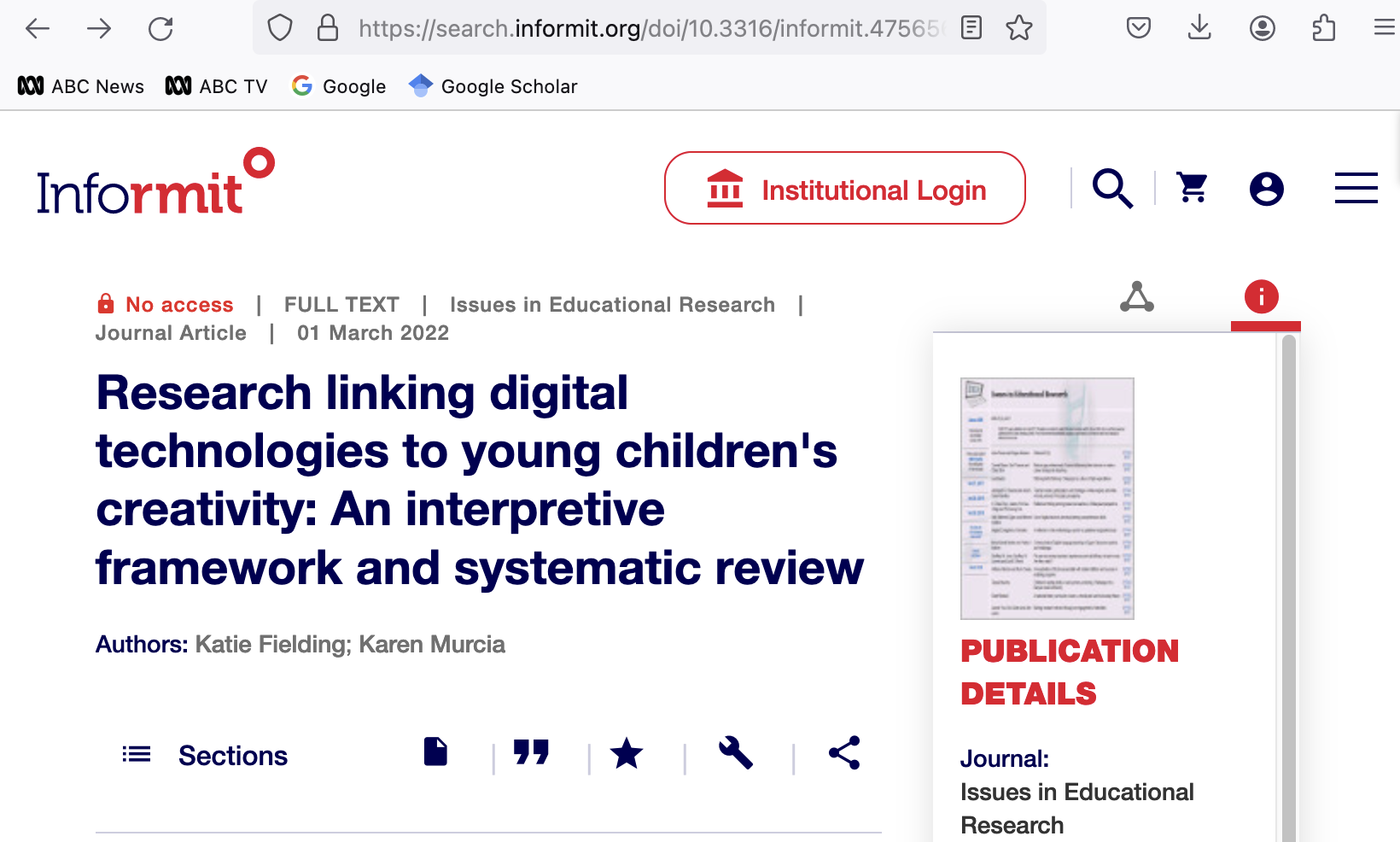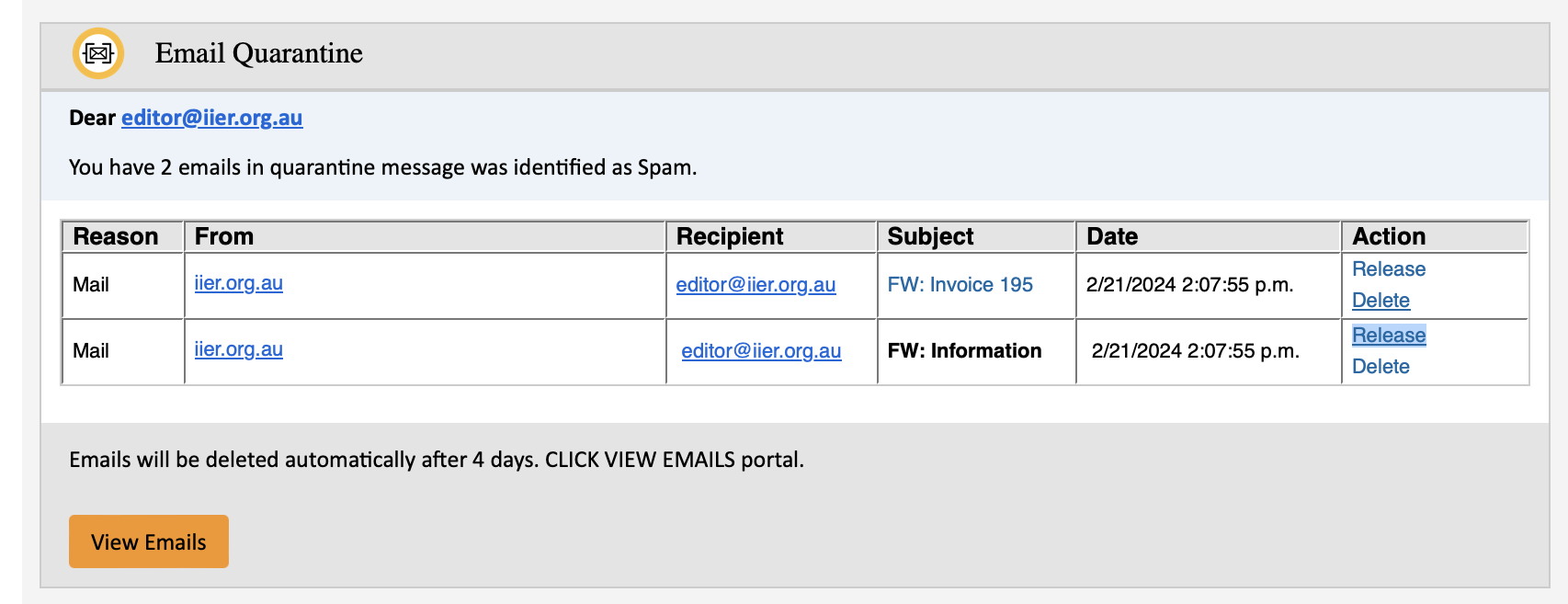
 |
IIER Editorial 34(1): (i) Introducing a guest editorial; (ii) Editorial miscellanea
Roger Atkinson and Clare McBeath
IIER Co-Editors, Australia
However, fast forward 20 years to IIER's re-introduction of the guest editorial, kindly undertaken in this issue by Dr Paul Gardner from the School of Education, Curtin University. IIER has viability, but we perceive an increasingly urgent need to obtain scholarly inputs in response to questions that may be likened to an IIER journal review process:
We recommend that authors self-assess the quality of a proposed submission, by searching IIER (see http://www.iier.org.au/about/iier-search.html) using keywords that are relevant for your article. The main question will be, "Can I do as well as, or perhaps even better than, similar articles already published in IIER?" Another important question will be, "Is my topic, country context, research question, or some other aspect under-represented in IIER?"Whilst the role perceived for guest editorials is quite specific, guidelines for composing a guest editorial are a work in progress, although a few indications may be offered. Composers of guest editorials will be invited by IIER, although topic proposals from an individual or several academic researchers may be submitted. Guest editorials should be relatively brief, perhaps 1500-2000 words including references. Another intention is that composers will have full academic recognition, being able to cite their IIER journal review as a scholarly publication, in sharp contrast to the usual reviews of journal article submissions, that have to be strictly confidential. We are well aware of "... a huge difference in the incentives and recognition researchers get for publishing compared with reviewing" [4], so the guest editorial format we are exploring intends to enable an attractive incentive, "publishing".
Composers of guest editorials will have a broad freedom to structure and illustrate their nominated topic as they see fit. However, there is a limitation in this idea of an IIER journal review process. Composers of guest editorials will not have any access to articles that have been rejected by IIER's review process, although we hope that guest editorial inputs, based upon the articles that IIER has published, will help to refine our process for initial assessment. As a very approximate average, initial assessment results in only about one sixth of submissions being flagged for external review, whilst about five sixths become "editorial rejects".
Also hopefully, guest editorials will help us to maintain and improve IIER's positioning in relation to a vitally important perspective, the "multilingual educational research community", to paraphrase Arenas-Castro (2024) [5]. Although writing about biology research, Arenas-Castro's outline accords very closely with IIER's experiences:
For the first time in history, a single language dominates global scientific communication. But the actual production of knowledge continues to be a multilingual enterprise.To paraphrase Arenas-Castro (2024) again, "So how are we [IIER] doing?" [5]. Paul Gardner's guest editorial [6] gives us a welcome 'thumbs up' (colloquial, refer Macquarie Dictionary or similar, or Google). Perhaps we could expand a little (though not disagreeing) with Paul Gardner's characterisation of IIER as "a welcome 'home' for 'renegade' researchers and counter discourses". In some or even many of IIER's article source countries, being a 'renegade' and promulgator of 'counter discourses' is risky; it is safer and perhaps more productive to present yourself as a passionately dedicated worker for your students, your school, your profession and teaching specialities, your community and for many, your research. 'Go with their flow' (to paraphrase a perspective from some other discourses), not one's own 'flow'.The use of English as the norm poses challenges for scholars from regions where English is not widely spoken. They must decide whether to publish in English for global visibility, or publish in their native language to make their work accessible to local communities. And when they work in English, they end up expending more time and effort writing and revising papers than their native English-speaking peers.
As gatekeepers of scientific knowledge, academic publishers play a key role in helping or hindering the participation of a multilingual scientific community. So how are they doing? [5]
However, there is at least one very important exception to the "not one's own flow" advice in the preceding paragraph. This is academic career progression, for which journal article publishing is a highly important, even absolutely essential component. It is a 'frequently worried about' topic in IIER editorials [7, 8]. Selecting a few from the many that we can use to fill our self-imposed cap of about 80 articles per year is to a large extent like deciding whose career we help to progress, and whose career, very regrettably, we cannot help.
miscellaneaAfter some reading of dictionary definitions, "miscellanea" seemed to be a good choice, just change "literary compositions" to editorial compositions or writings. The purposes are diverse and miscellaneous, although in this initial Miscellanea there is an underlying theme of editorial 'timewasting' and 'timesaving'.
noun
miscellaneous items, especially literary compositions, that have been collected together.
Oxford Languages Dictionarymiscellanea
plural noun
: a collection of miscellaneous ... objects or writings
Merriam-Webster Dictionary
Has Google partially solved IIER's problem with "A curiosity from Informit"?
In Editorial 32(3) under the heading "Google Scholar searches for IIER articles: A curiosity from Informit" RA outlined how RMIT University's Informit service was publishing misleading and incorrect information about IIER articles. We did receive one reply from Informit, but our copy seems to be lost or accidentally deleted. However, we recall that Informit's respondent was unhelpful, did not undertake to make corrections and denied making payments to Google. Much more important matters intervened, including the growth of a backlog in reviewing, and copy editing for IIER 34(1).
However, it was during copy editing for 34(1) that "A curiosity from Informit" resurfaced. One of the 34(1) articles cited this reference:
Fielding, K., & Murcia, K. (2022). Research linking digital technologies to young children's creativity: An interpretive framework and systematic review. Issues in Educational Research, 32(1), 105-125. https://search.informit.org/doi/10.3316/informit.475656822715647Routine copy editing corrected this to:
Fielding, K. & Murcia, K. (2022). Research linking digital technologies to young children's creativity: An interpretive framework and systematic review. Issues in Educational Research, 32(1), 105-125. http://www.iier.org.au/iier32/fielding.pdfJust routine, but in this case as copy editor RA followed up with the following Google search (copy and paste into web reader address box):
Obtaining a very interesting result! Until a few months ago, the first result was a link to Informit. Now, the first result is what it should be, namely IIER (Figure 1).

Figure 1: Illustrative Google search result for Fielding and Murcia (2022)
(ranked first, IIER file 'Screenshot 2024-02-22 at 7.51.48 am.png')
The Informit result is now several results lower, though it still contains the highly misleading "padlock" and "shopping cart" symbols, and an equally misleading web address, https://search.informit.org/doi/10.3316/informit.475656822715647 (Figure 2).

Figure 2: Illustrative Google search result for Fielding and Murcia (2022)
(ranked third, after IIER and ERIC, but before database competitors
ProQuest and EBSCO; IIER file 'Screenshot 2024-02-22 at 7.52.22 am.png')
So, it seems to us that Google changed something at a time between publication of 33(2) on 23 June 2023 and 8 October 2023, that changed the page ranking of .iier.org.au from lower than .informit.org, to higher. There's no time available to investigate further, but we surmise (and hope) that Google is now ranking a primary source (such as .iier.org.au) above a secondary source such as Informit, or ERIC, or ProQuest, or EBSCO, or others. It may be premature, but we say "Thank you, Google", for a timesaver that reduces the need to allocate any of our time to communicating to Informit. Informing Informit about publication of Editorial 34(1) will suffice.
An example of self-plagiarism
Mention of a "timesaver" in the preceding Miscellanea item prompts another mention, in this case from recent editorial correspondence. Cases of self-plagiarism encountered in IIER submissions are rare, perhaps about 0.2%, but the email quoted below is being retained as a template and a reference.
From: Roger Atkinson <rjatkinson@bigpond.com>We are very conscious of the problem of authors often having to endure long waiting times for review advice. There may be an understandable temptation to submit to several journals, hoping that one journal may provide a relatively rapid response that is positive. Under pressure from increases in submission rates, we are increasing our use of the following template (February version) as a rapid response, usually accompanied with brief suggestions about another journal:
Subject: IIER: Cancelling acceptance of submission [deleted] due to self-plagiarism
Date: [deleted]
To: [deleted]
Hello [deleted],
This email is to formally advise you that we have withdrawn IIER's acceptance of your article "[title deleted]" submitted to IIER on [date deleted] and accepted on [date deleted] for IIER [volume and issue no. deleted]. The reason is that we have become aware of the publication:
[full reference deleted]
This publication is nearly identical to your IIER submission. Therefore we regard it as a case of self-plagiarism.
Your failure to withdraw the IIER submission has consumed editorial staff time during a period when we (along with very many other journals) are often struggling to cope with sharp rises in submission rates and shortages of editorial staff and reviewers. We note that [journal name deleted] annotated your submission, "[annotation deleted" You submitted almost simultaneously to two journals, which is a very unfortunate ethical breach.
An appropriately anonymised version of my advice to you will appear in IIER Editorial 34(1) (time permitting).
Dr Roger Atkinson
Co-editor, IIER
http://www.iier.org.au/
After a careful consideration of your article submitted on [date], "[title]", we regret to advise that we decline to accept it for IIER publication.An illustrative phishing attempt
We regret that due to the emergence of a backlog in IIER's review process, we have temporarily suspended or curtailed our providing of the formative advice from IIER editorial staff that usually accompanies IIER's "Initial assessment" advice. The backlog is due to continuing high rates of submission, and some recent retirements of associate editors. During 2023, IIER has averaged 69.0 submissions per month, including 95 in December. In January and February 2024 we recorded 138 submissions. We apologise for the delay this has created for our responding to February submissions.
In time, we will resume the usual provision of formative advice under the heading "IIER editorial staff comments". We are very aware of the value of advice on reasons for declining a submission, and suggestions on how to attain an acceptable standard for publication in an international journal. However, resumption may take some months, owing to the current high rate of submission of articles and the problem of long queues waiting for responses.
Therefore, we advise, please send your article to another journal.
We wish you all the best for the successful continuation of this research.


Figure 3: Screen picture for a phishing attempt encountered by IIER
Under "View Emails", "Release" and "Delete" there is the same link: https://cloudflare ipfs.com/ipfs/ba[....]#editor@iier.org.au where [...] indicates about 112 alphanumeric characters deleted in order to avoid perpetuating a potentially very dangerous phishing address. Although this phishing attempt is only one of very many we encounter in IIER and non-IIER emails, it seem timely to record it in Miscellanea as "illustrative" for a good number of reasons. The main reason is being a timewaster for IIER editorial staff who are seeking to implement timesavers. Actually, it was only the usual 5-10 seconds timewaster, because it contained an abundance of the usual clues. A somewhat larger timewasting occurred in composing some thoughts that became illustrated by this example.
It could be an example of a well-educated computer programmer with nowhere else to go for employment. A wasteful misuse of a creative talent? Hosting a phishing program (though unknowingly) could be an unfortunate and severe undermining of Cloudflare's advertising about "How does Cloudflare help organizations defend against phishing attacks?" (https://www.cloudflare.com/learning/access-management/phishing-attack/) [9] This example is a good reminder to ourselves and others about sustained vigilance concerning hacking and phishing. It is now four years since the IIER and WAIER hacking reported in Editorial 30(1) [10]. A few of the citations in the References lists copy edited for IIER 34(1) were not accessible or needed workarounds because their web addresses led to a phishing threat.
Inquiry regarding acquisition of Issues in Educational Research
It has been some time since our last note about acquisition of IIER, in Editorial 30(1) [10]. Arrival of "Inquiry Regarding Acquisition of Issues in Educational Research" by email on 10 March 2024 has prompted this item in Miscellanea. It is from AGSER, Auricle Global Society of Education and Research, which self-categorises as "... an esteemed organization committed to advancing scholarly research and disseminating knowledge across various disciplines." It also "... boasts a wide network of scholars, researchers, and professionals from diverse fields ... committed to fostering collaboration, encouraging interdisciplinary studies, and nurturing academic excellence." Most notably, a large sum is offered:
After thorough evaluation and consideration, our society is pleased to offer USD 70,000 (Negotiable) for the acquisition of the Issues in Educational Research. We firmly believe that our organization's extensive resources, experience, and dedication to promoting quality research align perfectly with the mission and objectives of your esteemed publication.However, AGSER lacks presence in educational research journals, as its sole international representative among the collection at https://agser.org/#/research-journals-international appears to be Kuwait Journal of Education (https://kuwaitjournals.com/index.php/kje). At 27 March 2024 its archives comprised only one issue, namely 1(1), 2023, containing 5 articles.
Time being short, AGSER will receive only a terse reply (though not as strongly worded as the Editorial 30(1) item), "Thank you for the interest in IIER, but the journal is not for sale".
| Authors: Dr Roger Atkinson and Dr Clare McBeath are two of IIER's current Co-editors.
Please cite as: Atkinson, R. & McBeath, C. (2024). IIER Editorial 34(1): (i) Introducing a guest editorial; (ii) Editorial miscellanea. Issues in Educational Research, 34(1), ii-x. http://www.iier.org.au/iier34/editorial34-1.pdf |